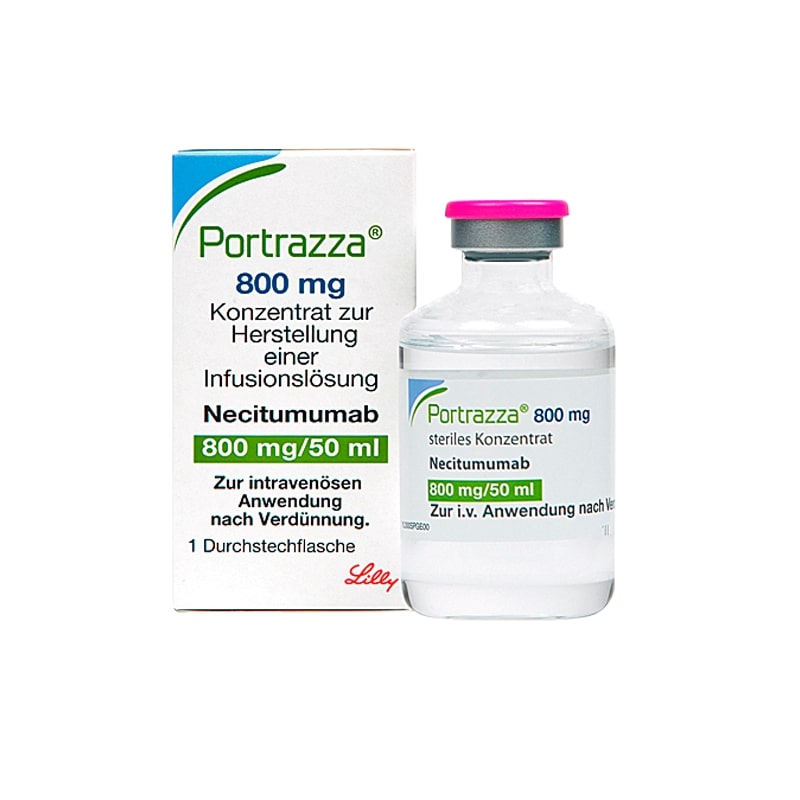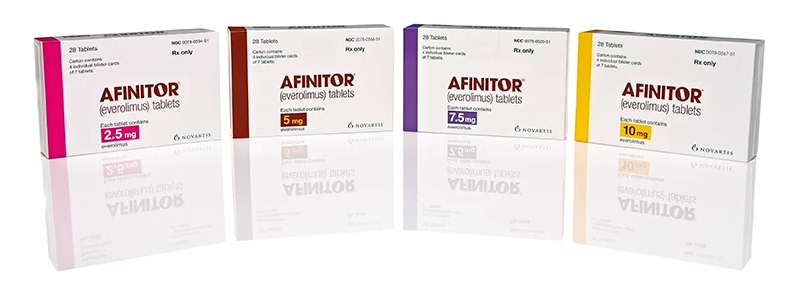Portrazza (necitumumab) vs Afinitor (everolimus)
Portrazza (necitumumab) vs Afinitor (everolimus)
Portrazza (necitumumab) is a monoclonal antibody designed to target and block the epidermal growth factor receptor (EGFR), which is often implicated in the growth and spread of certain types of cancer, particularly non-small cell lung cancer (NSCLC). It is specifically approved for use in combination with chemotherapy for the first-line treatment of patients with metastatic squamous NSCLC. On the other hand, Afinitor (everolimus) is an mTOR inhibitor that works by interfering with cellular signaling pathways to prevent tumor cells from growing and dividing; it is used to treat various types of cancer, including advanced renal cell carcinoma, certain breast cancers, and neuroendocrine tumors, among others. The choice between Portrazza and Afinitor would depend on the specific type of cancer a patient has, the stage of the disease, and the molecular characteristics of the tumor, as well as the patient's overall health and treatment history. It is essential for patients to consult with their oncologist to determine which medication is most appropriate for their individual condition.
Difference between Portrazza and Afinitor
| Metric | Portrazza (necitumumab) | Afinitor (everolimus) |
|---|---|---|
| Generic name | Necitumumab | Everolimus |
| Indications | Metastatic squamous non-small cell lung cancer (NSCLC) | Advanced hormone receptor-positive, HER2-negative breast cancer; advanced neuroendocrine tumors; renal cell carcinoma; subependymal giant cell astrocytoma (SEGA); renal angiomyolipoma; tuberous sclerosis complex (TSC) |
| Mechanism of action | Epidermal growth factor receptor (EGFR) antagonist | mTOR inhibitor |
| Brand names | Portrazza | Afinitor, Afinitor Disperz |
| Administrative route | Intravenous | Oral |
| Side effects | Rash, magnesium deficiency, venous thromboembolism | Mouth ulcers, infections, rash, fatigue, diarrhea, decreased appetite |
| Contraindications | Hypersensitivity to necitumumab or its excipients | Hypersensitivity to everolimus or other rapamycin derivatives |
| Drug class | Monoclonal antibody | mTOR inhibitor, immunosuppressant |
| Manufacturer | Eli Lilly and Company | Novartis Pharmaceuticals |
Efficacy
Portrazza (necitumumab) Efficacy in Lung Cancer
Portrazza (necitumumab) is a monoclonal antibody designed to target the epidermal growth factor receptor (EGFR), which is often overexpressed in certain types of lung cancer. Specifically, it is approved for use in combination with gemcitabine and cisplatin for the first-line treatment of patients with metastatic squamous non-small cell lung cancer (NSCLC). Clinical trials have demonstrated that the addition of necitumumab to chemotherapy can lead to a modest improvement in overall survival compared to chemotherapy alone. However, it is important to note that the efficacy of necitumumab is limited to patients with squamous NSCLC and is not indicated for non-squamous NSCLC.
Afinitor (everolimus) Efficacy in Lung Cancer
Afinitor (everolimus) is an mTOR inhibitor that has been studied in various types of cancer, including lung cancer. While it is not primarily indicated for the treatment of lung cancer, it has shown some efficacy in clinical trials involving patients with advanced non-small cell lung cancer. In particular, everolimus has been evaluated in patients with progressive neuroendocrine tumors of the lung and has shown to provide some benefit in terms of disease stabilization. Nonetheless, the use of everolimus in lung cancer is considered off-label, and its efficacy may not be as significant as in other approved indications such as renal cell carcinoma and certain types of breast cancer.
It is crucial for healthcare providers to consider the specific characteristics of the lung cancer subtype when determining the appropriateness of either Portrazza (necitumumab) or Afinitor (everolimus) for treatment. The efficacy of these drugs is highly dependent on the molecular profile and histological subtype of the tumor, and their use should be guided by evidence-based protocols and the latest clinical research findings.
As with any medical treatment, the decision to use Portrazza or Afinitor should involve a comprehensive discussion between the patient and their healthcare team about the potential benefits and risks. It is also important for patients to be monitored closely for any side effects and for the healthcare team to make adjustments to the treatment regimen as necessary based on the patient's response to therapy.
Regulatory Agency Approvals
Portrazza
-
European Medical Agency (EMA), European Union

-
Food and Drug Administration (FDA), USA

-
Health Canada

Afinitor
-
European Medical Agency (EMA), European Union

-
Food and Drug Administration (FDA), USA

-
Health Canada

-
Pharmaceuticals and Medical Devices Agency (PMDA), Japan

-
Therapeutic Goods Administration (TGA), Australia

Access Portrazza or Afinitor today
If Portrazza or Afinitor are not approved or available in your country (e.g. due to supply issues), you can access them via Everyone.org.
How it works

Make an enquiry
Choose the medicine you want to buy, answer a couple of questions, and upload your prescription to speed things up. We’ll get back to you within 24 hours.


Make an enquiry
Choose the medicine you want to buy, answer a couple of questions, and upload your prescription to speed things up. We’ll get back to you within 24 hours.


Breeze through the paperwork
We'll guide you through the required documents for importing unapproved medicine, ensuring you have all the necessary information.


Get a personalized quote
We’ll prepare a quote for you, including medicine costs and any shipping, administrative, or import fees that may apply.


Receive your medicine
Accept the quote and we’ll handle the rest - sourcing and safely delivering your medicine.

Some text on this page has been automatically generated. Speak to your physician before you start a new treatment or medication.
Let's talk
If you have any questions, call us or send us a message through WhatsApp or email:
Contact us




